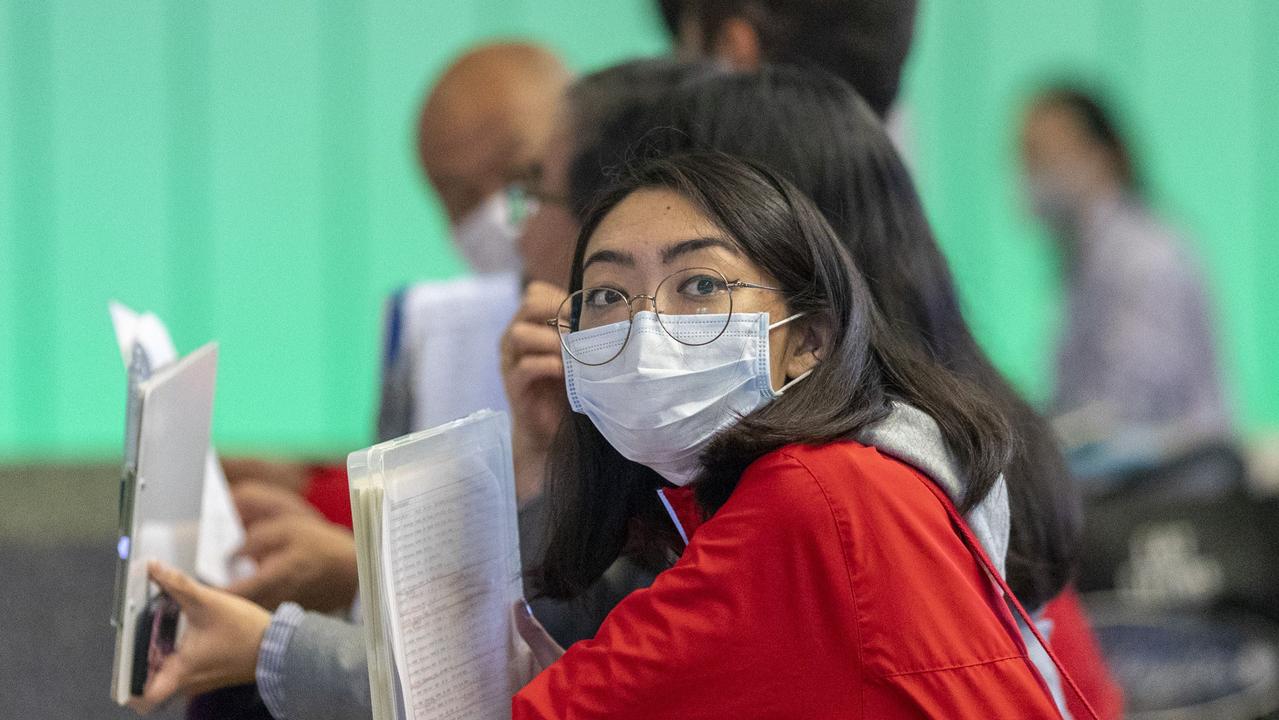What will happen if the coronavirus is declared a pandemic?
As fears about the coronavirus continue to mount, one key word will determine what happens next.

As the number of coronavirus infections continues to grow each day, you’ve probably seen the word “pandemic”floating around.
A pandemic refers to the worldwide spread of a disease, and is generally defined as an outbreak that affects two or more regions.
RELATED: Scary response from China’s neighbours to coronavirus
RELATED: WHO declares global emergency over coronavirus
If a pandemic is declared, it could have global consequences and contribute to an increased state of worldwide panic.
Some experts have warned that a coronavirus pandemic is inevitable — but not everyone agrees. What’s the deal?
CORONAVIRUS IS ‘NOT A PANDEMIC’
World Health Organisation (WHO) officials today said the coronavirus is yet to be declared a pandemic.
“We are not in a pandemic,” said Dr Sylvie Briand, director of the WHO’s Infectious Hazards Management Department. “We are at the phase where it is an epidemic with multiple foci.”
This essentially means the coronavirus is largely contained to China, with a small number of imported exceptions in other countries.
“We will try to extinguish the transmission in each of these,” she added, noting that the agency believes this “can be done with containment measures currently in place”.
Some experts have warned that the coronavirus will almost certainly become a pandemic in the near future.
“It’s very, very transmissible, and it almost certainly is going to be a pandemic,” Dr Anthony Fauci, director of the US National Institute of Allergy and Infectious Disease, told the New York Times earlier this week. “But will it be catastrophic? I don’t know.”
But the University of Sydney’s Associate Professor Adam Kamradt-Scott said that, while the virus is “definitely concerning”, it’s important to stress that 99 per cent of cases are currently contained to mainland China.
“We’ve obviously seen cases appear internationally and with the exception of a few countries, they’ve been imported,” he told news.com.au. “The other case we’ve seen is a small number of localised transmissions, which has been through partners or family members.”
What would be more concerning is if the coronavirus started spreading through local communities — that is, among anyone who didn’t directly contract the virus in mainland China.
“What we haven’t seen yet is widespread localised community transmission. At that point you would expect the WHO to declare a pandemic.”

Prof Kamradt-Scott said much of the focus will be on figures coming out of China over the next few days, as experts hope for a drop-off in the number of infections.
“We’re waiting to see the number of confirmed cases from China,” he said. “This will give us an indication of the extent to which quarantine measures in Wuhan have proved effective.
“If they have been effective, we can expect to see a rapid decline. If that doesn’t occur, what it would indicate is that the quarantine measures were put in place too late.”
In recent weeks, evidence has emerged that local Chinese authorities in Hubei province attempted to cover up the initial phases of the outbreak, and weren’t quick enough to declare a health crisis and shut down the epicentre of the disease.
But Prof Kamradt-Scott noted the Chinese government has come out “very strongly” since then to combat the virus.
“Ever since they announced the outbreak, they’ve been responsive and transparent, and continued to share on a daily basis the number of confirmed cases. They’ve also been very willing to talk about the measures they’ve put in place to halt the spread.”
WHAT WOULD THIS MEAN FOR AUSTRALIA?
If a pandemic is declared, the Australian government will activate the “national pandemic preparedness plan”.
This is a plan draw up by health experts to deal with a contagious disease pandemic, and includes three levels of severity.
But overall, Prof Kamradt-Scott said it’s unlikely that such a declaration would have a substantive effect on the Australian government’s response.
“The government has already mobilised its National Incident Room and has continued to escalate its response, which should be substantive,” he said.
In other words, unless the virus is declared a pandemic due to a significant spread through our own communities — which is unlikely — you can expect little to change even if the WHO starts using the P-word.
On the weekend, Prime Minister Scott Morrison announced that travellers who had visited mainland China from Saturday, February 1, would be stopped from entering Australia unless they were citizens, permanent residents or their immediate family.
Mr Morrison said they were taking the drastic action on the advice of the Chief Medical Officer and other medical experts, to “substantially reduce the volume of travellers coming from mainland China”.
The WHO has said countries shouldn’t be closing their borders to China but Mr Morrison said he was taking the action “because our medical advice is it’s in the interest of Australians to do so”.
HOW WILL THE CORONAVIRUS END?
There are multiple possibilities, but Prof Kamradt-Scott said it’s too early to tell how the virus will play out.
In a best-case scenario, the spread of the virus will get under control through public health interventions, and basically fizzle out.
The best example of this is SARS, which had killed over 700 people in 14 countries by 2003, but had basically died out by 2004.
“It could go the way of SARS, which was basically contained by 2004, and we’ve never seen it reappear,” said Prof Kamradt-Scott. “This is a best-case scenario.”
It could also just become another common virus, and come and go with the seasons, much like an ordinary flu.

But a real concern is if it continues to spread globally, particularly into regions that don’t have the medical facilities to contain it.
“The big concern is if the virus makes its way to Africa, given the limited laboratory capacity and fairly poor health systems there,” said Prof Kamradt-Scott. “It would then become endemic.
“The worst-case scenario is the virus continues to mutate and become more and more severe, and then go on to spread internationally.”
An even more tangible fear is if the virus makes its way to less-developed countries in Asia, such as Cambodia and Myanmar, where some leaders have been accused of taking a lax response to it.
Dr David Heymann, who led the WHO’s response to the SARS outbreak, said it’s too early to tell when the new virus will peak, but that it appears to still be on the increase.
He said the spike in China’s caseload in recent days is partly attributable to the fact that officials have expanded their search to include milder cases, not only people with pneumonia.
He declined to predict whether the virus would ultimately cause a pandemic, or worldwide outbreak, noting that as the new virus starts to spread beyond China, scientists will gain a better understanding of it.
“What we will see is the clearer natural history of the disease,” he said, as those exposed to the virus “are being traced and watched very closely,” he said.
Prof Kamradt-Scott stressed the need for a global effort to invest in preparing for future outbreaks.
“One of the challenges we see is this cycle of panic and neglect — people panic about outbreaks like this, and then when it’s over they go back to how they were, ignoring that we need better systems in place,” he explained. “We need to get out of this cycle, because the nature of the current environment we’re in where everyone is so interconnected means we’re going to see these types of events spread rapidly and internationally.
“We need to be better prepared.”



